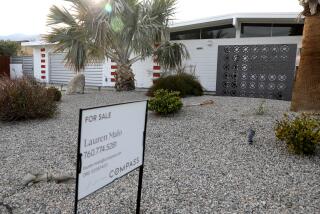Tracking the Fax Version of Vacation Come-Ons
- Share via
The office fax machine rumbled, and out came a sales pitch, breathless yet oddly corporate.
“Interoffice memorandum,” it began. “To: All management, employees, friends and family. Subject: End of year inventory . . . LIQUIDATION!!! “
The one-page missive offered a four-night “Disney Orlando area vacation” or a three-night “Daytona beach front” package, priced at just $69 a person for the first 200 buyers. It listed an 800 number and was signed “Sincerely, Corporate Travel Division.”
As it happens, this newspaper does have an in-house travel agency, but our travel agents had nothing to do with that fax. This pitch came from outside the company.
Federal regulators say thousands of such sales pitches arrive regularly in offices nationwide. At least four, bearing various 800 numbers, landed in this office in September. The hotel rates seemed remarkably low although none included air fare.
Two offered five- to seven-night hotel stays in Mexico, the Bahamas or Florida for $149 a person. One fax claimed the retail value of the package was more than $1,200. Both were full of “office speak.”
“Our wholesale travel department has been asked to forward this travel information to you and your employees,” one said.
Whose travel department? Where? What’s going on here, and just how many laws are being broken?
One answer, of course, is that marketing is going on, and it’s possible that no laws are being broken. In the language of the marketing trade, this is “blast-faxing”--the blanketing of consumers with a sales pitch by fax.
But many such faxes violate state and federal laws. Reasoning that an unsolicited fax takes up consumers’ resources and amounts to a greater threat to privacy than old-fashioned junk mail, Congress in 1991 approved Federal Communications Commission rules that prohibit transmission of unsolicited advertisements to fax machines.
In December 1999, the FCC fined Get-Aways Inc., a Camarillo travel agency, $85,500 for its fax practices and vowed to intensify enforcement of fax sales-pitch restrictions. An FCC representative said the government was unable to collect the fine. Get-Aways Inc. filed for Chapter 7 bankruptcy on June 30 and is not listed under telephone directory information.
Federal regulators and consumer advocates agree that these fax “bargain” offers frequently leave consumers frustrated (because of the strings attached, such as time-share presentations) or disappointed (often because of restricted availability or the quality of accommodations).
In general, state and federal consumer agencies say consumers should steer clear of ads that don’t disclose information about their origins and that consumers should be wary of offers that demand immediate action.
Two faxes to my office mentioned cruises. California Deputy Atty. Gen. Susan Henrichsen--whose own office also has received faxes like these--says that if an advertisement offers air or sea transport to California consumers but doesn’t include the company’s registration number as a California Seller of Travel, “it’s a violation of California law.” These faxes included no such information.
At the federal level, besides the FCC prohibition against unsolicited fax ads, the Federal Trade Commission (FTC) has recently taken new steps against companies promoting cut-rate trips by blast fax.
On Aug. 14, the FTC filed a complaint in a Florida federal District Court against Epic Resorts Inc. and Epic Travel Inc. of King of Prussia, Pa., and its principals, Thomas Flatley and Scott Egelkamp.
The company’s employees “send unsolicited faxes addressed to ‘all employees’ or ‘corporate employees’ advertising vacations at resorts in Florida and elsewhere, and often a cruise to the Bahamas,” the FTC’s complaint said. “Recipients respond by calling a toll-free number, where they reach one of the defendants’ telemarketers.”
In its complaint, filed in Orlando, where investigators say Epic does business, the FTC sought and received a 10-day temporary restraining order to stop Epic’s alleged deceptive marketing efforts, along with a 10-day freeze on the assets of Epic Travel, Flatley and Egelkamp. The case is pending, and Epic Resorts and Epic Travel remain in business.
The FTC argues that Epic’s sales strategy withheld important information from consumers, such as hidden costs and the role of time-share promotional presentation. Richard Capriola, an attorney for Epic Resorts and Epic Travel, said the companies have done nothing wrong, are unaware of unsolicited faxes and have a policy against sending unsolicited faxes. The trial is scheduled for October 2001.
Consumers can complain about false or deceptive telephone solicitation sales practices to the Federal Trade Commission, Consumer Response Center, Drop H 285, 6th St. and Pennsylvania Ave. N.W., Washington, DC 20580; Internet https://www.fcc.gov/ccb/consumer_news/unsolici.html. (For an independent consumer advocate’s view of the issue, see the Internet site https://www.junkfaxes.org.)
As for the faxes to my office, I made several follow-up calls on the $69-a-person pitch. I found that taxes and additional fees bumped the price up from $69 to more than $102. Also, one company representative said that follow-up paperwork might direct me to a “mandatory” time-share sales presentation, but I didn’t really have to go.
Even if the idea of an unsolicited fax doesn’t bother you, these kinds of revelations should make consumers wary. So should the actions of one fax-blasting company operator who thought he had just about sold me on one of his packages. When I told him I had to consult my wife first and call back, he hung up on me.
That might be the first true favor ever done for me by a telemarketer.
Christopher Reynolds welcomes comments and suggestions, but cannot respond individually to letters and calls. Write Travel Insider, Los Angeles Times, 202 W. 1st St., Los Angeles, CA 90012 or e-mail chris.reynolds@latimes.com.
More to Read
Inside the business of entertainment
The Wide Shot brings you news, analysis and insights on everything from streaming wars to production — and what it all means for the future.
You may occasionally receive promotional content from the Los Angeles Times.











